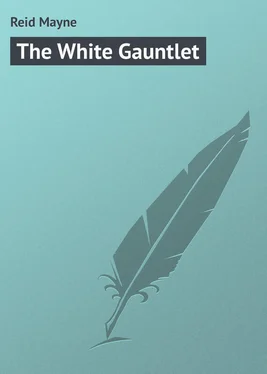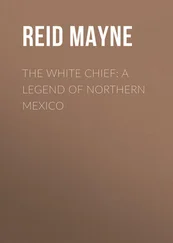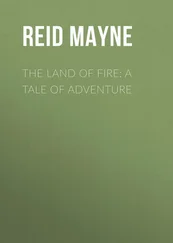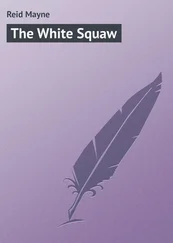Mayne Reid - The White Gauntlet
Здесь есть возможность читать онлайн «Mayne Reid - The White Gauntlet» — ознакомительный отрывок электронной книги совершенно бесплатно, а после прочтения отрывка купить полную версию. В некоторых случаях можно слушать аудио, скачать через торрент в формате fb2 и присутствует краткое содержание. Жанр: foreign_prose, foreign_children, на английском языке. Описание произведения, (предисловие) а так же отзывы посетителей доступны на портале библиотеки ЛибКат.
- Название:The White Gauntlet
- Автор:
- Жанр:
- Год:неизвестен
- ISBN:нет данных
- Рейтинг книги:5 / 5. Голосов: 1
-
Избранное:Добавить в избранное
- Отзывы:
-
Ваша оценка:
- 100
- 1
- 2
- 3
- 4
- 5
The White Gauntlet: краткое содержание, описание и аннотация
Предлагаем к чтению аннотацию, описание, краткое содержание или предисловие (зависит от того, что написал сам автор книги «The White Gauntlet»). Если вы не нашли необходимую информацию о книге — напишите в комментариях, мы постараемся отыскать её.
The White Gauntlet — читать онлайн ознакомительный отрывок
Ниже представлен текст книги, разбитый по страницам. Система сохранения места последней прочитанной страницы, позволяет с удобством читать онлайн бесплатно книгу «The White Gauntlet», без необходимости каждый раз заново искать на чём Вы остановились. Поставьте закладку, и сможете в любой момент перейти на страницу, на которой закончили чтение.
Интервал:
Закладка:
“Some pretty shepherdess of the Chilterns – some sweet wood nymph, no doubt? Well, here’s to her! And now,” continued the officer, without lowering the goblet from his lips, “since I’ve drunk to your mistress, you’ll not refuse the same compliment to my master – the King. You won’t object to that toast, will you?”
“By no means,” replied Walter, “I drink it willingly; though the king and I have not parted the best of friends.”
“Ha! ha! ha! friends with the king! His Majesty has the honour of your acquaintance, eh?”
“I have been nearly three years in his service.”
“A courtier?”
“I have been page to the queen.”
“Indeed! Perhaps you have no objection to favour us with your name?”
“Not the slightest. My name is Wade – Walter Wade.”
“Son of Sir Marmaduke, of Bulstrode Park?”
“I am.”
“Ho! ho!” muttered the questioner, in a significant tone, and with a thoughtful glance at the young courtier.
“I thought so,” stammered the cornet, exchanging a look of intelligence with his superior officer.
“Son to Sir Marmaduke, indeed!” continued the latter, “In that case, Master Wade, we are likely to meet again; and perhaps you will some day favour me with an introduction to your sweet shepherdess. Ha! ha! ha! Now for the toast of every true Englishman – ‘The King!’”
Walter responded; though with no great willingness: for the tone of the challenger, as well as his words, had produced upon him an unpleasant impression. But the toast was one, that, at the time, it was not safe to decline drinking; and partly on this account, and partly because the young courtier had no particular reason for declining, he raised the goblet once more to his lips, as he did so, repeating the Words – “to the king.”
The cornet, drinking from a cup of his own, echoed the sentiment; and the troopers under the tree, clinking their beer measures together, vociferated in loud acclaim: – “the king – the king!”
Volume One – Chapter Seven
After this general declaration of loyalty, there was a lull – an interval of profound silence – such as usually succeeds the drinking of a toast.
The silence was unexpectedly broken, by a voice that had not yet mingled in the chorus; and which was now heard in clear, firm tones, pronouncing a phrase of very different signification: – “the people!”
A sentiment so antagonistic to the one so late issuing from the lips of the troopers, produced among them an instantaneous commotion. The soldiers, seated under the tree, started to their feet; while the officers faced in the direction whence the voice had come – their eyes angrily flashing under the umbrils of their helmets.
He, who had so daringly declared himself, was not concealed. A horseman, of elegant appearance, had just ridden up, and halted in the middle of the road; where the landlord – apparently without orders, and as if accustomed to the service, – was helping him to a goblet of wine. It was this horseman who had called out: “The People!”
In the enthusiasm of their loyalty, his arrival had either not been observed by the troopers, – or at all events no notice had been taken of it, – until the emphatic pronunciation fell upon their ears like the bursting of a bomb. Then all eyes were instantly turned towards him.
As he gave utterance to the phrase, he was in the act of raising the wine cup to his lips. Without appearing to notice the effect which his speech had produced, he coolly quaffed off the wine; and with like sang froid , returned the empty goblet to the giver.
The defiant insolence of the act had so taken the troopers by surprise, that they stood in their places – just as they had started up – silent, and apparently stupefied. Even the officers, after hurrying forward, remained speechless for several seconds – as if under the influence of an angry amazement. The only sounds for a while heard were the voices of the spectators – tapsters, stable-helpers, and other idlers – who had clustered in front of the inn – and who now formed an assemblage, as large as the troop itself. Despite the presence of the armed representatives of royalty, the sentiment of these was unmistakeably the same, as that to which the strange horseman had given voice; and they were emphatically complimenting themselves , when they clinked their pewter pots, and in chorus, proclaimed: “The People!”
Most of them, but the moment before, and with equal enthusiasm, had drunk “the King;” but in this sudden change of sentiment they only resembled most politicians of modern times, who have been dignified with the name of “Statesmen!”
But even among these tapsters and stable-helpers, there were some who had refrained from being forced into a lip loyalty; and who echoed the second sentiment with a fervent spirit, and a full knowledge of its everlasting antagonism to the first.
When the ultimate syllable of this sacred phrase had died upon the ear of the assembled crowd, it was succeeded by a silence ominous and expectant. Two individuals commanded the attention of all – the captain of the cuirassiers, and the horseman who had halted upon the road: the toaster of the “king,” and the proposer of the “people.”
The soldier should speak first. It was to him that the challenge – if such he chose to consider it – had been flung forth.
Had it been a rustic who had uttered it – one of the assembled crowd – even a freehold farmer of puritanic pretensions – the cuirassier captain would have answered him on the instant, perhaps with steel added to the persuasion of his tongue. But a cavalier, of broad bands, and gold spurs buckled over Spanish leather boots – astride a noble steed – with a long rapier hanging handy anent his hip – was an individual not to be ridden over in such haste, and one, whose “argument” called for consideration.
“Zounds, sir!” cried the captain of the cuirassiers, stepping a pace or two forward, “from what Bedlam have you broken loose? Me thinks you’ve been tasting too freely of the Saint Giles’s tap; and ’tis that which makes your speech smell so rankly. Come, fellow! Uncover your head, and tune your tongue to a different strain. You go not hence, till you’ve purged your traitorous throat by drinking the toast of every true and loyal gentleman of England – ‘The King.’”
“Fellow, indeed!” exclaimed the cavalier, looking scornfully askance at him who had dictated the insulting proposition. “A fellow!” he continued, in a calm but satirical tone, “not in the habit of drinking toasts with strangers. Yours is not to his liking, any more than your fashion. If he had the fancy to drink to England’s king, it would not be in the company of those who have disgraced England’s fame – at the ford of Newburn.”
Gathering up his reins as he spoke, and giving utterance to a taunting laugh, the strange horseman pressed the spur against the sides of his splendid steed, and started off at a swinging gallop along the road.
It was only when that laugh rang in his ears, that the cuirassier captain became roused to the full frenzy of rage; and, with eyes on fire, and brow black as midnight, he rushed forward, sword in hand, in a frantic attempt to strike down the insulter.
“Disloyal knave!” cried he, lungeing out to the full length of his arm, “thou shalt drink the king’s health in thine own blood! Ha! stop him!” he continued, as the horseman glided beyond his reach – “My pistols!”
“Ho, there!” shouted he to his followers. “Your carbines! Fire upon him! Where are your weapons, you careless vagabonds? To horse, and follow!”
“An ye take my advice, masters,” put in the landlord of the inn – a sturdy tapster of independent speech – “ye’ll stay wheer ye are. An ye doan’t, ye’ll be havin’ yeer ride for nothin’. Ye mawt as well gie chase to a wild goose. He’ll be two mile frae this, ’fore you can git astride o’ your nags.”
Читать дальшеИнтервал:
Закладка:
Похожие книги на «The White Gauntlet»
Представляем Вашему вниманию похожие книги на «The White Gauntlet» списком для выбора. Мы отобрали схожую по названию и смыслу литературу в надежде предоставить читателям больше вариантов отыскать новые, интересные, ещё непрочитанные произведения.
Обсуждение, отзывы о книге «The White Gauntlet» и просто собственные мнения читателей. Оставьте ваши комментарии, напишите, что Вы думаете о произведении, его смысле или главных героях. Укажите что конкретно понравилось, а что нет, и почему Вы так считаете.












